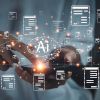InfoQ Homepage Culture & Methods Content on InfoQ
-

Platform as a Runtime - the Next Step in Platform Engineering
As systems become larger and more complex we need to take the concepts of platform engineering to a higher level – to the code level – by creating platforms and abstractions that will reduce cognitive load, help simplify and accelerate software development, and allow for easy maintenance and upgrades to the platform. Let’s move from “platform” to “Platform as a Runtime”.
-

Using Generative AI in Software Project Management to Bridge Domains and Accelerate Productivity
Gen AI Assistants play to the strengths of professionals with a breadth of experience, particularly software developers who can describe what they want the LLM to complete and critically evaluate the result. These tools enable us to swiftly cross divides of domain language and scale large repetitive tasks down to interesting ones on a human scale.
-

Delivering Great Developer Experiences with Platform Engineering
Companies increasingly turn to platform engineering to help scale their development teams and increase developer experience for engineer efficiency. In this virtual panel, we’ll discuss how teams build platforms, set others up for success, work with developers who use their platform, measure their progress, and adapt to new challenges.
-
Accelerating Technical Decision-Making by Empowering ICs with Engineering Strategy
Carta harnesses the power of a small group of senior engineers called navigators to bridge the gap between global strategy and local decision-making, using a written engineering strategy. Navigators replace a need for consensus and boost velocity by combining technical context, domain context, strategic alignment, and judgment to make engineering decisions quickly.
-
The Three As of Building A+ Platforms: Acceleration, Autonomy, and Accountability
Platform engineering is not just a technical problem to solve nor an end in itself. In this article, I will share key lessons I have learned while building and delivering three platforms over the last two decades from VMware and Stripe to Apollo GraphQL, including where we got stuck, how we unblocked ourselves, and what ultimately led to the right outcomes for our users and the business.
-
How to Build and Foster High-Performing Software Teams: Experiences from Engineering Managers
Engineering managers can enable software teams to learn and improve, and help them move problems and impediments out of the way. In this virtual panel, we'll discuss how engineering managers support teams, what skills they possess, and how they establish alignment and foster knowledge and experience sharing between teams.
-
InfoQ Culture & Methods Trends Report - April 2024
The Culture and Methods trends report discusses evolving roles within teams, the way the staff plus roles are able to add value, the use and misuse of DevEx metrics, how remote work continues to evolve, a lack of diversity is still a challenge, and the need to move from climate change awareness to climate conscious software engineering.
-
Leading Tech People or Remaining a Software Engineer: What to Choose? Panel Discussion
In this virtual panel, we explore what made people decide to become a leader and how they did it, and we'll find out if we really have to leave tech forever or if there's a way back into engineering.
-
Getting Technical Decision Buy-In Using the Analytic Hierarchy Process
Making large, important technical decisions is a critical aspect of a senior individual contributor's role. This article examines how Comcast has employed the Analytic Hierarchy Process (AHP), a decision-making framework developed in the 1970s, and adapted it for making technical and non-technical decisions both large and small.
-
Testing Machine Learning: Insight and Experience from Using Simulators to Test Trained Functionality
When testing machine learning systems, we must apply existing test processes and methods differently. Machine Learning applications consist of a few lines of code, with complex networks of weighted data points that form the implementation. The data used in training is where the functionality is ultimately defined, and that is where you will find your issues and bugs.
-
Advice for Engineering Managers: Enabling Developers to Become (More) Creative
As an engineering manager, it is your responsibility to help facilitate creative thinking skills among the development team, but that's easier said than done. This article provides advice on how can you help amplify the creative thinking skills of your software development colleagues. We examine how different levels of creativity influence creativity and strategies to encourage creativity.
-
Four Steps to Achieving Operational Flow and Improving Quality in Tech Teams
No matter the team or organisation size, there’s always more to do than is possible to get done. That’s why it’s so important for work to flow effectively. This article discusses four steps to achieving operational flow and improving quality in tech teams.